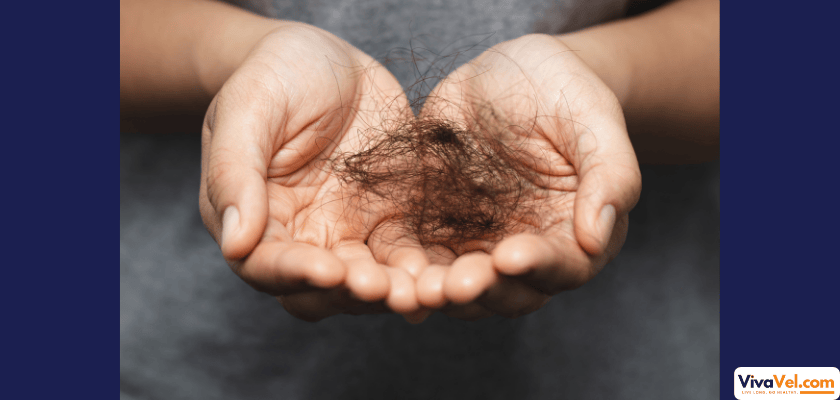
Home / Information / Blog / Blog Detail

The monsoon brings welcome relief after the hot summer days. However, this weather change can also pose problems for your hair. The extra moisture in the air causes hair follicles to swell, which can lead to increased hair fall. Studies show that hair fall can rise by up to 30% during the monsoon season. To help you avoid this issue, in this blog, we will discuss the causes of monsoon hair fall and share practical solutions to keep your hair healthy and beautiful throughout the season.
Why Does Hair Fall More in the Monsoon?
Increased Humidity
The monsoon season causes a significant rise in humidity levels, which is the main factor behind increased hair fall. High humidity causes hair to absorb more moisture from the air, resulting in the swelling of hair shafts, making the hair more susceptible to breakage and split ends.
Additionally, excess moisture can weaken hair roots, making hair more likely to fall out. Controlling humidity with anti-humidity hair products and keeping hair as dry as possible can help reduce this problem.
Rainwater Exposure
Rainwater isn't as pure as it seems. It often carries pollutants, dirt, and harmful chemicals from the atmosphere. When hair comes into contact with rainwater, these contaminants can settle on the scalp and hair, causing irritation and damage. The impurities in rainwater can weaken hair strands, making them more prone to breakage.
Tip: If you get caught in the rain, rinse your hair with clean water and then use a gentle shampoo and conditioner.
Fungal Infections
The combination of moisture and warmth creates an ideal environment for fungal infections to develop on your scalp. Conditions like dandruff or ringworm can cause itching, inflammation, and increased hair loss.
To avoid this, maintain a clean and dry scalp, and use antifungal shampoos if you're prone to these issues.
Hair Care Tips to Control Hair Fall in Monsoon
Keep Your Scalp Clean
Keeping your scalp clean is essential during the monsoon season to prevent the buildup of dirt, oil, and sweat. Regular washing helps eliminate these impurities and lowers the risk of scalp infections that can cause hair fall. Aim to wash your hair two to three times a week with lukewarm water. Over-washing can strip the scalp of its natural oils, so striking a balance is crucial.
Use gentle shampoos and conditioners.
Selecting the right hair products is crucial for maintaining healthy hair during the monsoon. Choose gentle, sulfate-free shampoos that are gentle on your scalp and hair. Harsh shampoos can strip natural oils, causing dryness and breakage. Use a lightweight conditioner in conjunction with your shampoo to hydrate your hair without weighing it down. Look for conditioners with ingredients such as aloe vera, argan oil, and shea butter for added nourishment.
Deep Condition Weekly
To combat frizz and restore strength, treat your hair to a deep conditioning mask once a week. Choose masks or treatments rich in natural oils, proteins, and vitamins to replenish moisture and reduce breakage.
Comb Gently
Wet hair is more prone to breakage, and the monsoon season often makes your hair more damp. Using a wide-tooth comb helps gently detangle your hair without causing too much breakage. Start from the ends and work your way up to the roots to reduce hair fall.
Avoid a Tight Hairstyle
Tight hairstyles, such as ponytails, buns, and braids, can put stress on the hair follicles, leading to hair breakage and hair fall. During the monsoon, it's best to opt for loose hairstyles that don't tug on the hair. Loose braids, low ponytails, or simply leaving your hair down can help reduce tension on the scalp and minimize hair fall.
Avoid Heat Styling
Heat styling tools, such as blow dryers, straighteners, and curling irons, can cause substantial damage to your hair, making it more prone to breakage. During the monsoon, try to minimize the use of these tools and embrace your natural hair texture. If you must use heat styling, apply a heat protectant spray beforehand and use the lowest heat setting possible. Let your hair air dry whenever possible to maintain its health and reduce the risk of heat-induced hair loss.
Nutrition Tips for Stronger Hair
Eat a nutrient-rich diet.
A balanced and nutrient-rich diet is crucial for maintaining healthy hair, especially during the monsoon season when hair fall may increase. Ensure your diet includes a variety of foods rich in vitamins and minerals that support hair health. Here are some key nutrients and their sources:
Proteins: Hair is mainly made of a protein called keratin. To promote stronger hair, incorporate protein-rich foods such as eggs, fish, lean meats, dairy products, legumes, and various nuts into your diet.
Iron: A lack of iron can contribute to hair thinning. To prevent this, consume iron-rich options such as lentils, spinach, quinoa, pumpkin seeds, and red meat.
Omega-3 Fatty Acids: These healthy fats are essential for nourishing hair and encouraging growth. Add sources like salmon, mackerel, chia seeds, flaxseeds, and walnuts to your meals for a healthy addition.
Vitamins A and C: Vitamin A supports the scalp’s natural oil production, while Vitamin C aids in collagen formation, which strengthens hair strands. Include foods such as sweet potatoes, carrots, citrus fruits, bell peppers, and strawberries.
Biotin (Vitamin B7): This B vitamin plays a crucial role in maintaining hair health and promoting growth. Good dietary sources include avocados, whole grains, almonds, and eggs.
Zinc: Zinc is vital for repairing hair tissue and maintaining healthy oil glands around the hair roots. Foods like beef, oysters, spinach, and pumpkin seeds can help meet your zinc needs.
Stay Hydrated
Staying well-hydrated is vital for both overall well-being and healthy hair. Proper hydration ensures that your scalp remains moist, creating a supportive environment for hair growth. On the other hand, not drinking enough water can lead to dry, brittle strands that are more prone to breakage.
Try to consume around 8 to 10 glasses of water each day, and consider increasing that amount if you're physically active or living in a humid environment. In addition to water, include water-rich foods like watermelon, cucumbers, oranges, and celery in your diet to boost hydration levels.
✅ Final Thoughts
Monsoon hair fall is common, but with the proper care routine and healthy eating habits, you can maintain strong, nourished, and healthy hair. Be gentle with your hair, give your body the nutrients it needs, and avoid harsh styling tools — and you'll get through the season with confidence.
🧑⚕️ FAQs – Expert Answers to Common Hair Fall Questions
Q1. Why does monsoon trigger hair fall?
Humidity, fungal infections, and chemical exposure from rainwater all contribute to increased hair shedding during this season.
Q2. Should I shampoo daily?
Not unless necessary. Two to three times a week is ideal. Overwashing can dry out your scalp.
Q3. Can I oil my hair during the monsoon?
Yes, but avoid heavy oils that can trap moisture and attract dust. Light oils like argan or almond oil are better. Always shampoo thoroughly afterward.
Q4. What if I still have heavy hair fall?
If hair fall persists beyond 4–6 weeks despite good care, consult a dermatologist or trichologist. You may have underlying issues like iron deficiency, hormonal imbalance, or post-infection hair shedding.
Got a monsoon hair care secret?
What is your hair care secret? We’d love to hear from you! Share with us your tips for preventing hair fall during the rainy season on our Facebook page.

Delhi, the capital of India, has tragically earned the notorious title of one of the most polluted cities in the world. The thick, gray smog that envelops the city, especially during winter, is not merely an environmental issue; it represents a serious health crisis. In this discussion, we will explore the causes of air pollution in Delhi, its effects on health, and potential measures to mitigate these impacts.

Winter is here! While it brings cozy sweaters, hot cocoa, and festive cheer, it also presents unique challenges for your skin. The drop in temperature, coupled with low humidity and indoor heating, can deplete your skin of its natural moisture, leading to dryness, flakiness, and irritation. However, with the proper skincare routine and tips, you can maintain a radiant, healthy complexion all winter. Here's a comprehensive guide to winter skincare:

As the cold winds blow and temperatures drop, we often think of staying warm and cozy. However, winter also brings significant health risks, especially regarding our heart health. Studies have shown that heart attacks are more common during the winter months, and there are several reasons behind this phenomenon. In this blog, we will explore why heart attacks increase in winter and what steps you can take to safeguard your heart.
STEP 1
Let us know your details and preferences. We maintain absolute data confidentiality. All your health records are safe, and privacy is maintained.
STEP 2
A dedicated counsellor will help you with the Best Hospital & Doctors at the lowest possible Prices.
STEP 3
While you decide on the treatment plan, we assist you with priority appointments, Visa, Documentation, Hotel & other Logistics.
STEP 4
Our team assists you with all your local requirements like Hospitalization, Hotel Stay, Transportation, Food, Forex, Lab Tests, Medicines, etc.
STEP 5
We ensure a smooth discharge process. We also assist you in tallying your bills at the hospital, all necessary documentation, and your return trip.
Happy Patient from Bangladesh | Gastroenteritis Treatment in Columbia Asia Hospital, India

"VivaVel" has truly made a life-changing impact on our lives during a challenging time. My wife was diagnosed with Polycystic Ovarian Disease (PCOD), and despite consulting three different doctors in Bangladesh, we were unsatisfied and uncertain about the way forward. It was a confusing and challenging phase until a friend recommended VivaVel.
From the moment "I contacted them", VivaVel provided exceptional support and guidance. They arranged telemedicine consultations with two renowned international doctors, giving us the confidence to make an informed decision. After careful consideration, we selected one of the doctors for my wife's treatment.
VivaVel's assistance went above and beyond our expectations. They helped us with critical processes like obtaining a medical visa invitation letter, visa processing, and coordinating my wife's admission to "Artemis Hospital" in Delhi. They even suggested comfortable accommodations for me as a patient attendant.
What truly stood out was their unwavering support throughout our journey. The "VivaVel team" was always just a phone call away, offering guidance and reassurance during our stay in Delhi. Their professionalism and dedication to helping patients and their families are truly commendable.
I am incredibly grateful for the care and support from "VivaVel." They were a beacon of hope for us during this difficult time, and I sincerely hope they continue their outstanding service to help more needy patients.
Thank you, "VivaVel," for being there for us every step of the way!
Mr. Hoque, Dhaka, Bangladesh
Patient name: Shanta Islam, Dhaka, Bangladesh.

Note : VivaVel does not provide medical advice, diagnosis or treatment. The services and information offered on www.vivavel.com are intended solely for informational purposes and cannot replace the professional consultation or treatment by a physician. All Copyrights are reserved with VivaVel. VivaVel does not allow copying and cloning of its webpages and contents. VivaVel reserves the right to follow the legal procedures to protect its intellectual property.
Copyright © 2025 VivaVel.com . All Rights Reserve.





